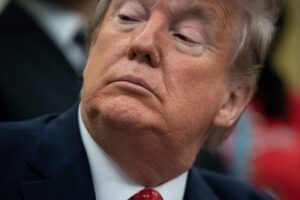
(Photo by Drew Angerer/Getty Images)
It was a good Friday for the Justice Department, who got a bit closer to clarity on a theory that it has used to prosecute dozens of January 6 defendants and which is likely to be crucial to any future prosecution of Donald Trump for the events of that day.
The decision came down from the DC Circuit on interpretation of 18 USC § 1512(c)(2), which reads:

Introducing LexisNexis Protégé™ in Lex Machina®
Lex Machina harnesses generative AI capabilities to revolutionize the way legal professionals interact with data to improve bottom line for their business.
(c) Whoever corruptly—
(1) alters, destroys, mutilates, or conceals a record, document, or other object, or attempts to do so, with the intent to impair the object’s integrity or availability for use in an official proceeding; or
(2) otherwise obstructs, influences, or impedes any official proceeding, or attempts to do so, shall be fined under this title or imprisoned not more than 20 years, or both.
Nearly every judge on the federal court in DC, including multiple Trump appointees, have accepted the government’s view that this law proscribes attempts by Capitol Riot defendants to obstruct Congress. Their view was that a plain reading of the statute makes clear that it can be violated by conduct which satisfied either (c)(1) or (c)(2) — i.e. that the word “otherwise” in (c)(2) does not make it dependent on (c)(1).
But Judge Carl J. Nichols refused to accept this interpretation, ruling in the cases of Garret Miller, Joseph Fischer, and Edward Jacob Lang that “§ 1512(c)(2) must be interpreted as limited by subsection (c)(1), and thus requires that the defendant have taken some action with respect to a document, record, or other object in order to corruptly obstruct, impede or influence an official proceeding.” Essentially, he held that violation must encompass destruction of a document, not simply obstruction of an official proceeding, and thus the statute did not apply to these defendants.
The government appealed, as indeed it had to, with so many prosecutions at stake. Judge Nichols’s oddball ruling functioned as a touchstone for every January 6 defendant seeking to appeal their case, jeopardizing hundreds of prosecutions.

The Trump Gold Card: A New $1 Million Pathway To A U.S. Green Card
A new proposal would let wealthy foreign nationals secure an opportunity for a U.S. green card with a $1 million 'gift' to the government, sparking legal and ethical debate.
Lawfare describes the oral argument before DC Circuit Judges Florence Pan, Justin Walker, and Gregory Katsas, the latter two of whom were appointed by Trump himself. The post suggests that Judge Walker disagreed with the appellees’ position, but believed that the word “corruptly” must refer to an act carried out “with an intent to procure an unlawful benefit either for himself or for some other person.” And indeed, that is exactly how it wound up shaking out in this opinion, with Judge Walker concurring with Judge Pan that (c)(2) covered the obstructive conduct and overruling Judge Nichols’s dismissal of the charge, but disagreeing that “corrupt” was a catchall phrase that means basically “illegal.”
Nevertheless, Judge Walker agreed that the charges should not have been dismissed.
“Even under the proper, narrow reading of “corruptly,” the indictments should be upheld,” he wrote, adding that, at trial “it might be enough for the Government to prove that a defendant used illegal means (like assaulting police officers) with the intent to procure a benefit (the presidency) for another person (Donald Trump).”
In the main, however, he agreed with Judge Pan, a Biden appointee, who described the trial judge’s interpretation of the statute as “cramped,” “document-focused” and “dubious because the words of § 1512(c)(1) are already quite comprehensive.”
Judge Katsas dissented in favor of Judge Nichols’s interpretation, but for now, the Justice Department’s prosecutions under § 1512(c) live to fight another day. And the theory of obstruction likely to be applied to the former president remains intact.
The D.C. Circuit Holds the Power to Upend Hundreds of Prosecutions of Jan. 6 Rioters [Lawfare]
DC CIRCUIT UPHOLDS 18 USC 1512(C)(2), SORT OF [Empty Wheel]
Liz Dye lives in Baltimore where she writes about law and politics and appears on the Opening Arguments podcast.